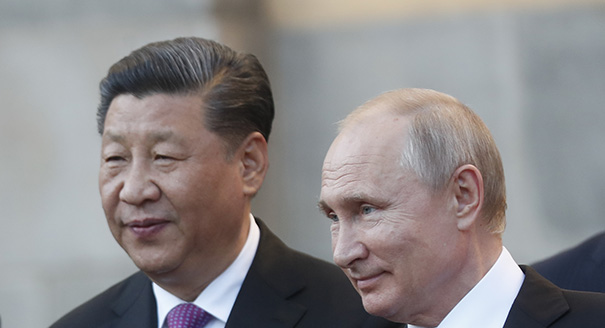{
"authors": [
"Paul Haenle",
"Dmitri Trenin",
"Feng Yujun",
"Eugene Rumer",
"Shang Yue",
"Alexander Gabuev"
],
"type": "event",
"centerAffiliationAll": "",
"centers": [
"Carnegie Endowment for International Peace",
"Carnegie China"
],
"collections": [],
"englishNewsletterAll": "",
"eventCollection": [
"Global Dialogue Series"
],
"nonEnglishNewsletterAll": "",
"primaryCenter": "Carnegie China",
"programAffiliation": "",
"programs": [],
"projects": [],
"regions": [
"North America",
"United States",
"East Asia",
"China",
"Caucasus",
"Russia"
],
"topics": [
"Economy"
]
}
Responding to China’s Rise: Russia
Wed, October 23rd, 2019
Beijing
As the United States faces pronounced difficulties in its relations with Russia and China in both the security and economic spheres, China-Russia ties are steadily improving. Russia is now China’s largest provider of crude oil, and bilateral trade topped $100 billion for the first time last year. On the security front, the two countries are deepening military cooperation, and Russia has sold several advanced weapons systems to its neighbor. Presidents Xi Jinping and Vladimir Putin have struck up a strong friendship, with the former bestowing the latter with a first-of-its-kind friendship medal. Across the Pacific, the Trump administration’s withdrawal from the INF treaty has ratcheted up tensions with Moscow, and strains over the latter’s alleged election interference continue to linger. The relationship between Washington and Beijing is deteriorating as competition overtakes cooperation in economic, technological, and military ties, a trend that is likely to fundamentally change the world’s most consequential bilateral relationship. How is Russia responding to China’s rise, and what do warming China-Russia relations mean for the world? How do closer Moscow-Beijing ties affect their respective relationships with the United States? And how should the United States respond?
Carnegie–Tsinghua Director Paul Haenle moderated a discussion among scholars from the Carnegie Moscow Center, Carnegie's Russia and Eurasia program, Fudan University, and the China Institutes of Contemporary International Relations that examined the implications of warming China-Russia ties for the Asia-Pacific and wider global community.
This panel was the first of the Carnegie Global Dialogue Series 2019-2020 and was cosponsored by Fudan University’s Center for Russia and Central Asia Studies.
This event was off the record.
DISCUSSION HIGHLIGHTS
- An “Almost” Alliance: China and Russia are taking steps to solidify their relationship amid the deterioration in China-U.S. ties. Ahead of this year’s seventieth anniversary of the founding of the People’s Republic of China, Moscow and Beijing elevated their ties to be a “comprehensive strategic partnership of coordination for a new era.” However, the two countries are at different stages of development and have distinct views and capabilities, which will limit them from getting too close. The panelists noted that while China is an industrializing power with considerable economic strength, Russia is closer to a post-industrialized major power with more experience in great power diplomacy. China remains a relatively new great power with the potential to learn from others.
- Russian Perspectives on China: A panelist argued that Russia has overcome some fears about overrelying on China. Moscow now deems Beijing less of a rival and sees a realistic possibility of coexistence in Central Asia. Russia also realizes that the window of opportunity to sell arms to China is narrowing given Beijing’s growing capacity to design its own military technologies. The panelists noted that for Russia, maintaining close relations enables it to tap into Chinese technological innovation and digital infrastructures. Staying close to Beijing also helps Moscow undermine American military interests, for instance through the recent decision to supply China with missile early warning system. Nevertheless, other discussants said that Russia risks becoming increasingly reliant on China for trade and investment, amplifying its vulnerability to being dominated by Chinese technologies and suppliers.
- Chinese Perspectives on Russia: China’s reluctance to form an alliance is linked to a belief that, historically, Russia has damaged China more than the United States. One speaker also noted that Moscow has recently benefited from the relationship more than Beijing, as the former depends on energy exports to and technological support from the latter. Russia’s inability to offer much other than oil and gas, according to the speaker, will limit the bilateral relationship going forward.
- Huawei in Russia: Despite Moscow’s initial reservations, Huawei is now actively building Russia’s 5G infrastructure. The discussants noted that the Chinese company produces similar quality equipment to that of European competitors such as Ericsson and Nokia. However, Huawei’s technology is easier and cheaper to adapt to the Russian market. Security concerns also figure into Russia’s decision, as risks of Chinese spying are deemed less of a threat than reliance on NATO countries for crucial 5G infrastructure. In this case, one speaker noted, Russia has designated Huawei the less bad of the two options.
Paul Haenle
Paul Haenle holds the Maurice R. Greenberg Director’s Chair at the Carnegie–Tsinghua Center for Global Policy based at Tsinghua University in Beijing. His research focuses on Chinese foreign policy and U.S.-China relations.
Dmitri Trenin
Dmitri Trenin is the director of the Carnegie Moscow Center and the chair of its Foreign and Security Policy Program.
Feng Yujun
Feng Yujun is vice dean of the Institute of International Studies at Fudan University and director of the institute’s Center for Russia and Central Asia Studies.
Eugene Rumer
Eugene Rumer is a senior fellow and the director of Carnegie’s Russia and Eurasia Program.
Shang Yue
Shang Yue is a deputy research fellow at the CICIR Institute of Eurasian Studies.
Alexander Gabuev
Alexander Gabuev is a senior fellow and the chair of the Russia in the Asia-Pacific Program at the Carnegie Moscow Center.
Carnegie does not take institutional positions on public policy issues; the views represented herein are those of the author(s) and do not necessarily reflect the views of Carnegie, its staff, or its trustees.
Event Speakers
Paul Haenle held the Maurice R. Greenberg Director’s Chair at the Carnegie Endowment for International Peace and is a visiting senior research fellow at the East Asian Institute, National University of Singapore. He served as the White House China director on the National Security Council staffs of former presidents George W. Bush and Barack Obama.
Dmitri Trenin
Former Director, Carnegie Moscow Center
Trenin was director of the Carnegie Moscow Center from 2008 to early 2022.
Feng Yujun
Feng Yujun is vice dean of the Institute of International Studies at Fudan University and director of the institute’s Center for Russia and Central Asia Studies.
Rumer, a former national intelligence officer for Russia and Eurasia at the U.S. National Intelligence Council, is a senior fellow and the director of Carnegie’s Russia and Eurasia Program.
Shang Yue
Alexander Gabuev is director of the Carnegie Russia Eurasia Center. Gabuev’s research is focused on Russian foreign policy with particular focus on the impact of the war in Ukraine and the Sino-Russia relationship. Since joining Carnegie in 2015, Gabuev has contributed commentary and analysis to a wide range of publications, including the Financial Times, the New York Times, the Wall Street Journal, and the Economist.


